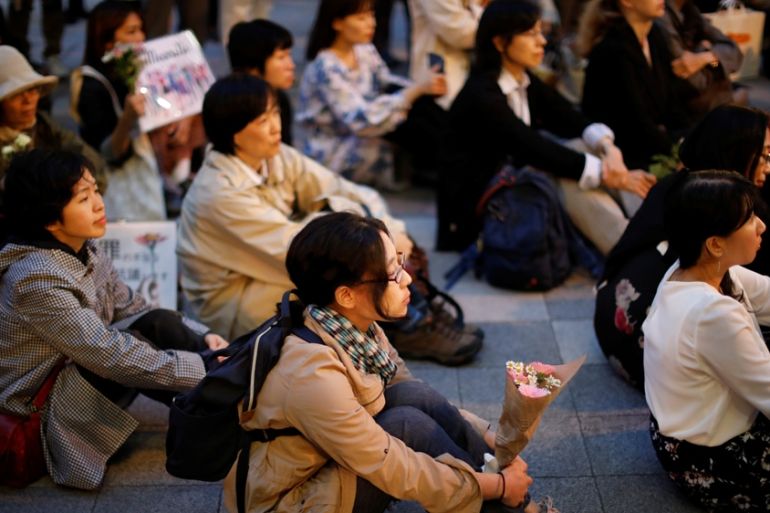Japan: Sexual abuse survivors protest for reforms
Recent acquittals of alleged rapists reignite debate over legal requirement to prove victims resisted attacks.

Survivors of sexual abuse and their supporters have rallied in nine cities across Japan to protest against recent court acquittals of alleged rapists and urge reform of the country’s anti-rape law.
Holding flowers and placards with slogans such as “#MeToo” and “#With You”, sexual abuse survivors on Tuesday night recounted their experiences to show the need to scrap a measure they say puts too high a burden on rape victims, discouraging them from coming forward and harming their legal chances if they do.
Keep reading
list of 4 itemsPoland lawmakers take steps towards liberalising abortion laws
Polish lawmakers debate reforming strict abortion laws
Why has Arizona re-enacted a 160-year-old abortion ban?
“If we keep saying ‘No’ to sexual violence and deliver our voices, I have hope this unreasonable law will surely be changed,” Misa Iwata, who said she was gang raped at 16, told a crowd of hundreds gathered near Tokyo Station.
“To raise one’s voice is frightening,” said Iwata, a member of sexual abuse victims’ group Spring. “But by raising our voices, society and politics will surely change.”
Legislators revised Japan’s century-old rape law in 2014 to include harsher penalties, among other changes.
The reforms, however, left intact controversial requirements for prosecutors to prove that violence or intimidation was involved or that the victim was “incapable of resistance”.
Recent acquittals have revived outrage over that legal standard, which means it can be impossible for prosecutors to prove a rape occurred if a woman does not fight back.
In one March ruling, a court in the central city of Nagoya acquitted a father accused of raping his 19-year-old daughter.
Victims and activists want the law changed to bar all non-consensual sex.
“This kind of case is continuing because most people don’t have the sense that the judgments are wrong,” designer Miku Yokoyama, a 23 year-old who attended Tuesday’s protest, told Reuters news agency.
The Tokyo protest was one of nine nationwide from Fukuoka in the south to Sapporo in the north and Osaka in western Japan. Organisers began holding the monthly protests in April.
The #MeToo movement has been largely subdued in Japan, where only a small number of sexual assault victims report the crime to police amid a climate of fear of being blamed and publicly shamed.
In 2018, Japan ranked 110th among 149 countries considered in the World Economic Forum’s Global Gender Gap report.